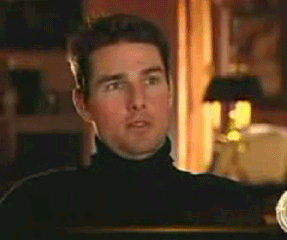
The Mummy is...
You know what? Screw and its weird, rapey subtext. I'll get to the movie in a second because Variety has a new report on some behind the scenes issues which apparently wrecked the film as well as allegations about the true size of the budget which means t he international market might not be the film's true savior after all. Let's talk about Tom Cruise for a second, though. Just how crazy do you think he is?

But he's not supposed to be. You don't become the biggest movie star in the world by being normal. There has to be something particularly extraordinary about you, and often times that means you're a bit eccentric. Sometimes, though, those eccentricities which once seemed endearing reveal themselves to have simply been hiding darker truths the entire time, resulting in fall-from-grace moments like Mel Gibson's anti-semitic rant, Arnold Schwarzenegger's sex scandals, Jim Carrey's various bizarre meltdowns and Tom Cruise's couch-jumping.
As I watched the flaming trainwreck that is The Mummy, a movie which seems tailor made to indulge Cruise's ego, I kept thinking back to Alex Gibney's damning documentary Going Clear: Scientology and The Prison of Belief. This is the documentary which chronicles the rise of Scientology in the eyes of those who've been lucky to escape the church, and highlights just how much the church's growth and sustainability has been due to an ongoing leveraging of Tom Cruise's celebrity, made possible thanks to David Miscaviage's conversion of Cruise from a largely lapsed Scientologist to full-on kool-aid drinking true believer in the 90s. It is also the documentary no one was allowed to ask Cruise about while he was out promoting Rogue Nation because his PR team and lawyers are very insistent, and after Oprah/Matt Lauer-gate Cruise has almost entirely shied away from discussing Scientology publicly.
So, now he's just the guy who does all of those logic-defying stunts which put American Ninja Warrior champions to shame, and tours the world doing talk shows which repeatedly produce viral videos of him finding something particularly funny and laughing like he just can't stop.
But I can't quite shake the Going Clear image of Cruise as an impossibly deluded maniac. Does the Tom Cruise shown below celebrating his 42nd birthday during a surprise party thrown for him on one of the church's boats have any idea that everyone there (according to Going Clear) was ordered to smile and call him sir, or that the people responsible for preparing the boat for the party were paid next to nothing (just as they are whenever the church makes them trick out Cruise's houses and luxury cars)? Moreover, what would be worse: that he knew and didn't care or had no idea?
Videos like that illustrate what it must be like to be Tom Cruise: everywhere you go everyone seems to love you and shower you with praise, some freely, others under orders, but who cares enough to figure out the difference. If he could be deluded enough to not recognize how hard Miscaviage has been playing him for decades it's equally likely that when he travels to world premieres in countries like China where he is still treated like the movie star he was in the 90s he's completely oblivious to how much their adoration of him is dependent on how cut off they were from Hollywood for so long (i.e., after the start of the Korean War the Chinese government blocked all Hollywoood blockbusters from playing in the country until 1994, and still limited the number of imported blockubsters to ten-per-year into the 2000s). He probably thinks everything is fine, and the diminished domestic returns (financially and, with few exceptions, critically) for anything he makes that's not named Mission Impossible just means he gets to travel more to those areas of the world where everyone loves him.
But everything is not fine, not with The Mummy at least, and Variety reports it might be Cruise's fault. The juiciest bits follow:
- Several sources close to the production say that Cruise exerted nearly complete (contractually-permitted) oversight on "The Mummy," essentially wearing all the hats and dictating even the smallest decisions on the set and even in the film's marketing and release strategy, advocating for a June debut in a prime summer period.
- Alex Kurtzman had been in the running to direct the project before Cruise signed on, but the actor gave his blessing for the filmmaker to slide behind the camera. They'd established a comfort level when Kurtzman worked as the screenwriter of "Mission: Impossible III." But as Kurtzman (who'd only directed one small movie prior to ihis) struggled to adjust to scope of the project, it felt more like Cruise was the real director, often dictating the major action sequences and micro-managing the production, according to sources.
It's worth remembering that Cruise is one of Hollywood's most skilled negotiators, becoming legendary in the 90s for securing complete creative control of all projects along with lucrative profit participation contracts which successfully circumvented Hollywood accounting designed to screw stars out of their money. Cruise was so good at it he ended up making more off of the Mission Impossible movies than Paramount, and when Paramount walked away from him following his Scientology meltdown he spent his next couple of years as a studio head of the relaunched United Artists label. That didn't work out, but ever since then he has been a highly controlling uber-producer on all of his starring vehicles, delivering them on time and on budget and putting in relentless hours of promotion.
This is partially why Universal's decision to cast him in The Mummy made no sense. Their goal (to launch a new horror-leaning cinematic universe centering on revived versions of the old movie monsters) and his goal (to make a standard Tom Cruise movie with a barely-there plot stringing together a series of highly choreographed stunts) were always destined to clash. However, if Universal did grant him creative control of the movie than nothing he reportedly did was particularly out of bounds, like:
- The actor personally commissioned two other writers along with Christopher McQuarrie to crank out a new script. Two of the film's three credited screenwriters, McQuarrie and Dylan Kussman, an actor-writer who played small roles in "The Mummy" and "Jack Reacher," were close allies of Cruise's. The script envisioned Nick Morton as an earnest Tom Cruise archetype, who is laughably described as a "young man" at one point [Might I add that he is in his 50s and his two female co-stars were either not born or not even a year-old yet when Risky Business came out].
- His writers beefed up his part. In the original script, Morton and the Mummy (played by Sofia Boutella) had nearly equal screen time. The writers also added a twist that saw Cruise's character become possessed, to give him more of a dramatic arc.
To be fair, Cruise's recent run of films indicate he recognizes the importance of strong leading ladies, but he never can seem to completely share the spotlight, even though his female co-stars keep outshining him (e.g., Rogue Nation, Edge of Tomorrow, Jack Reacher 2... even Boutella in
- Once the film was done, Cruise brought in his longtime editor Andrew Mondshein to piece together the final picture. (The film's credits also list Gina and Paul Hirsch as editors.) He spent time in the editing suite overseeing the cutting, which everybody agreed wasn't working. On the lot, there were differences of opinions about whether Cruise's directions were improving a picture that had been troubled from its inception or whether they were turning a horror film into a Cruise infomercial.
This time Cruise failed to bring his product in on budget. Universal is reporting a final budget of $125m but Variety hears it's more like $190m with another $100m in marketing. In that context, The Mummy' s $174m-worldwide debut might not be good enough to save Universal from ultimately taking a loss, not if the toxic word of mouth spreads.
Variety's sources might be wrong. Even if they're right, Cruise doesn't have to be the bad guy here. The decisions he made as part of his overhaul of The Mummy reflect poorly on him and his ongoing mid-life crisis, and speak to a man so surrounded by those who idolize and/or are so financially dependent on him that no one will tell him no. However, Universal gave him creative control, and the director wasn't cutting it. Cruise may have made some bad calls, but he stepped up to make the sure the movie got made, micro-managing it into meat and potatoes Tom Cruise movie, for better or worse, even though Alex Kurtzman had een going for a legitimate horror movie vibe.
What we witnessed is the unfortuate meeting of old Hollywood and new. Cruise ran this thing like he was still top gun, and Universal let him because they didn't truly believe in their concept of a bullshit cinematic universe attempting to mold old movie monsters into de factor superheroes and villains. However, if they had a better idea of what they were actually doing they never would have cast Cruise in the first place because big movie stars with considerable leverage (the type that demand creative control in all things and mold everything to their liking) and cinematic universes (the type that need a central braintrust of producers and writers steering the ship) don't mix. You can't really blame Tom Cruise for trying to make a Tom Cruise movie. You should really blame yourelf for clearly having no idea what kind of movie you actually wanted other than "one that makes a lot of money like those Marvel movies."

